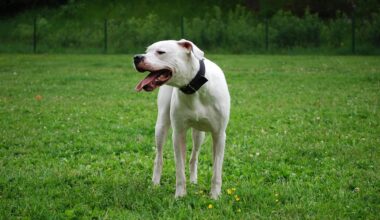Why Adenovirus Vaccination is Critical in Shelters and Dog Parks
The canine adenovirus, specifically CAV-1 and CAV-2, is known to be a highly contagious virus that causes significant health issues in dogs. Vaccination against this virus is crucial for pet owners, especially for those who often visit dog parks or shelters. This virus primarily affects the liver and respiratory systems, posing a serious risk to both young and adult dogs. Vaccinating helps form a protective barrier that reduces the likelihood of outbreak. Adenovirus vaccinations not only protect individual dogs but also contribute to community safety. In shelters, where the density of animals is high, the potential for virus transmission spikes dramatically. This makes it crucial to vaccinate all dogs entering shelters. Owners should ensure their dogs are vaccinated before visiting parks or boarding. It’s essential to follow the recommended vaccination schedule for puppies and adult dogs to receive optimal protection. The benefits of vaccination include not just health protection for your dog but involves a collective responsibility to keep all dogs healthy by reducing adenovirus presence in environments shared by many. Prioritizing vaccination is vital for community well-being.
Preventing diseases like adenovirus also means saving resources in veterinary settings. Veterinary care can be significantly costly, especially when dealing with infected animals. By vaccinating dogs against adenovirus, pet owners can minimize the risk of infections, thus alleviating pressure on veterinary clinics and emergency services. The time spent treating adenovirus infection could be better allocated to other health issues that dogs may face. Moreover, many shelters and rescue organizations now require proof of vaccination before admitting a dog. This policy not only protects new arrivals but also secures the health of the existing animals. By understanding the importance of vaccinations, potential adopters can make healthy choices for their new companions. Beyond immediate health impacts, the societal implications of an adenovirus-free environment are considerable. Communities with lower adenovirus rates see fewer emergency cases, which can lead to reduced operating costs for veterinary services. Thus, advocating for dog vaccinations ultimately serves both individual dog health and public health interests. Engaging in community education regarding vaccinations can further enhance awareness and participation in preventative measures.
The vaccination process against adenovirus typically involves a series of injections during a puppy’s early developmental stages. The initial vaccination is given around six to eight weeks old, followed by booster shots. These boosters are essential as they help solidify the immune response, ensuring that the dog develops robust immunity against the disease. The interval between vaccinations is vital because it allows the puppy’s immune system to mature and respond effectively. Dog owners are encouraged to consult with their veterinarians to establish a personalized vaccination schedule based on their dog’s lifestyle and health status. After completing the initial vaccination series, adult dogs will typically need a booster shot every one to three years, depending on individual factors. This ongoing commitment to adenovirus vaccination not only protects your dog but also contributes to the overall health of the dog park or shelter community. Reporting any incidences of adenovirus can help veterinarians and shelters track outbreaks more effectively. Educating pet owners about the risks of adenovirus and the importance of vaccinations can play a significant role in tackling this disease head-on.
In addition to vaccination, there are several preventive measures that dog owners should consider. Regular health check-ups for dogs can catch any potential issues before they escalate. Observing proper hygiene practices in communal areas like dog parks is essential. Pet owners should always clean up after their dogs and encourage others to do the same. This minimizes the chances of viruses spreading in outdoor spaces where dogs frequently interact. It’s also a good idea to avoid bringing unvaccinated puppies to public areas until they have received their full set of vaccinations. This step reduces the risk of young dogs contracting contagious diseases from other animals. Be mindful of your dog’s health; if you notice any signs of illness, such as lethargy or vomiting, consult a veterinarian promptly. Additionally, maintaining a healthy diet and regular exercise contributes to a strong immune system. Overall, the combination of vaccination, hygiene, and regular veterinary care forms a bulletproof strategy against adenovirus and other pathogens that threaten canine health. Protecting your dog should always be a priority, fostering a better environment for everyone.
Community Impact of Vaccination
The implications of canine adenovirus vaccinations extend beyond individual dogs and their families. In a broader community context, effective vaccination strategies can significantly lower the overall incidence of the disease among local canine populations. Reducing adenovirus outbreaks protects not just vaccinated pets but also enhances the safety of dogs who have not yet received their vaccines. It’s an approach rooted in herd immunity, where an increase in vaccinated individuals leads to decreased virus transmission. This not only promotes healthier environments in dog parks and shelters but also contributes to a generally happier and safer community. When vaccination rates are high, the likelihood of outbreaks drops. This, in turn, fosters confidence among pet owners to interact more freely with their dogs in public spaces, leading to better socialization opportunities for pets. Community events that encourage vaccination and education have become essential in raising awareness, making strides toward an adenovirus-free environment. By instilling knowledge and understanding, local governments, veterinarians, and shelters can work in unison to advocate for dog vaccinations, ensuring proper resources and engagement are available for all pet owners.
Participating in local vaccination drives and events becomes a crucial part of community efforts. These activities not only provide accessible vaccination options but also serve as platforms for education. Pet owners are encouraged to engage in conversations surrounding the significance of vaccinations. They can share experiences, ask questions, and receive essential information from experts such as veterinarians. Educators at these events can dispel myths and clarify misconceptions surrounding vaccinations. Together, these efforts lead to higher compliance rates among pet owners. Many pet owners may feel overwhelmed or unsure about the various vaccines available, and events can simplify the process, making it more approachable. Furthermore, collaborative initiatives could include local businesses sponsoring vaccination days or providing incentives for pet owners who ensure their dogs are vaccinated. These community-driven programs stimulate awareness and promote a culture of responsibility among dog owners. Networking creates a united front against canine diseases, reinforcing the idea that dog vaccination is not merely an individual concern, but a community imperative for good health and protection against diseases such as adenovirus.
In conclusion, the critical importance of adenovirus vaccinations for dogs cannot be overstated. This vaccine plays a vital role in ensuring the health and safety of dogs in public spaces, such as dog parks and shelters. The benefits of vaccinations extend far beyond the individual dog and encompass entire communities. By preventing the spread of adenovirus, we not only save lives but also reduce the burden on veterinary services and promote healthier environments. Dog owners must embrace vaccinations as a cornerstone of pet ownership, making informed decisions to prioritize their pets’ health. Awareness campaigns can further propel this message and galvanize public support for vaccination importance. Moreover, owners should remain vigilant about following through with suggested vaccination schedules, as timely vaccinations directly correlate to immune efficiency. Communities prosper when their canine populations are healthy and thriving. Ultimately, through commitment, education, and engagement, we can create a protective barrier against canine adenovirus and other infectious diseases, ensuring our parks and shelters remain safe havens. Together, we can champion a healthier future for all dogs, confirming that proper vaccination remains an invaluable aspect of responsible pet ownership.



